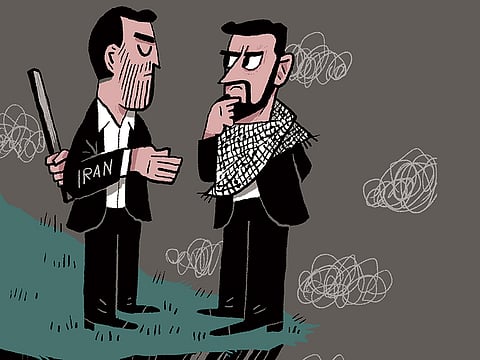Iran pushing Mideast into an abyss
It is about time that world community curbs Tehran’s destructive behaviour in the region and ask it to change course

Iran may continue to claim that its regional policy in the Middle East is constructive and mainly aims to help the region’s population to achieve peace and stability. But in fact, what Tehran has been doing in the Middle East, whether in Syria, Iraq, Lebanon, Palestine (mostly in Gaza) and the Yemen, is exactly the opposite. Iran’s action since 2012 in these countries, particularly Syria, and long before the appearance of Daesh [the self-proclaimed Islamic state in Iraq and Syria] in the war zone, is dangerously pushing the area into a deadly abyss. Through its own proxies, whether the Lebanese Hezbollah militia in Syria, Hamas in Gaza, Lijan Al Hashid Al Shaabi (Popular Mobilisation Committees) in Iraq or the Houthis in Yemen, Iran is creating havoc on a massive scale.
Through its full support for Bashar Al Assad’s regime in Damascus, Iran has successfully blocked all opportunities for political change in the country.
It is about time that Iranian leadership realise that the vast majority of the Arab population no longer trust Tehran’s policy in the region. All its rhetoric about standing up against Israel or “the Zionist state” has become a joke. But nevertheless, Iranian officials never stop attempting to deceive Arabs and Muslims in the neighbourhood.
Wiping out Israel
The latest of such attempts is the threat to demolish Tel Aviv and wipe it from the face of the earth. In his latest comment, the Secretary of Iran’s Expediency Council, Mohsen Rezaei claimed that his country “will level Tel Aviv to the ground.” Rezaei was talking to the Hezbollah’s Beirut-based Al Manar TV, responding to Israel’s prime minister, Benjamin Netanyahu’s remarks at the Munich’ security conference last week, in which he warned Iran “not to test Israel’s resolve”. Rezaei specifically said “if the Israelis carry out the slightest unwise move against Iran, we will level Tel Aviv to the ground and will not give any opportunity to Netanyahu to flee”. He added: “The US and Israeli leaders don’t know Iran and don’t understand the power of resistance and therefore, they continuously face defeat.”
Rezaei’s comments were carried by Mehr News Agency, run by the Islamic Ideology Dissemination Organisation. The Iranian official described Iran’s role as supporting what he called “resistance Front” stretching from Tehran to Gaza, claiming that the regime in Iran does not interfere in the Palestinian territories or in Lebanon “but merely offers advisory help.” Rezaei arrogantly added: “Iran does not want to dominate the countries in the region but wants them to stand on their own feet.”
Such pompous statements are not new to Arab ears, specially when they are directed at Israel. Prominent Arab leaders of recent past, particularly the late Jamal Abdul Nasser of Egypt and Iraq’s Saddam Hussain, famously bragged about their superior powers over Israel, claiming their missiles will reach ‘heart of the enemy’. It was Al Qaher (mighty) and Zafer (conqueror) rockets in case of Nasser, and Scuds in case of Saddam. Both leaders failed to effectively use their arsenal in any meaningful way against Israel. Instead, under Nasser’s watch, Arabs faced a defeat in the six-day June war of 1967. On the other hand, Saddam Hussain’s Scuds against Israel in 1991 following the Gulf war were simply intended to regain some of the dignity he lost after the invasion of Kuwait in August 1990.
Nasser’s media, which was dominantly the source of information, misinformed the Arab population in the first two days of the war that half of Israel’s air force were shot down and the Arab armies were approaching the gates of Tel Aviv. Under the given circumstances, one cannot view Rezaie’s comment outside the realm of hollow exaggeration and yet another attempt to divert public opinion away from the destructive action by Iran in Syria and beyond.
However, Iran’s main target is to establish itself as the super-regional power. Two factors are playing a supportive role to help Iran achieving that. First, a leadership vacuum which allows Iran to penetrate, almost unhindered, the Arab body politics. Second, unfortunately, Iran has found in the Russian president, Vladimir Putin, the best possible ally in the region. Both Russia and Iran could not have succeeded without each other. On the one hand, Moscow provided the valuable aircover for Tehran’s “Revolutionary Guards” and their proxy “Hezbollah” to deeply advance inside Syria. On the other, Iran, a strategically positioned country with solid ground presence, secured Russia’s victory in Syria.
Despite this strategically vital cooperation, Iran realises its limits when it comes to Israel. However, Tehran will not only face up to the US might in the unlikely event of war with Israel, but it’ll likely sacrifice the newly found alliance with Moscow. Sitting next to Iran’s foreign minister, Javad Zarif, Russia’s foreign minister, Sergey Lavrov openly criticised Rezaie’s comment last week. This happened during the Valdai International Discussion Club conference “Russia in the Middle East: Playing on All Fields”, Lavrov warned Iran: “We have stated many times that we won’t accept the statements that Israel, as a Zionist state, should be destroyed and wiped off the map. I believe this is an absolutely wrong way to advance one’s own interests.”
Mustapha Karkouti is a columnist and former president of the Foreign Press Association, London. Twitter: @mustaphatache


